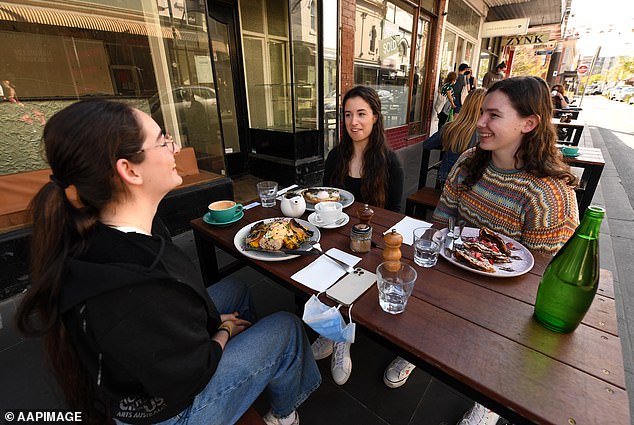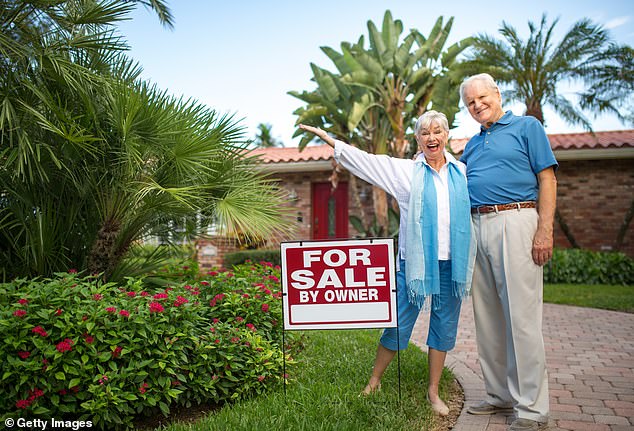Boomers hit back at ‘self-entitled whingeing’ young Aussies – and reveal why they’re not to blame for housing crisis
Angry baby boomers have hit back at young Aussies, blaming them for their housing woes.
Their outspoken defense of their right to stay is a response to census data showing idlers clinging to their large piles in the inner neighborhoods. while young families in the suburbs struggle with overcrowding and a shortage of rental housing.
‘We bought and paid for these homes; it is not our job to house the next generations, it is the government’s,” Kathleen Kyle explained in a letter to the Sydney Morning Herald.
“No one questions people who spend their money on nice cars or antiques, or suggests that they no longer need them.”
In another letter, Kathy Willis from Kew wrote: ‘Boomers have worked very hard to get what they have because they raised their families in these homes.
‘I would suggest that the discourse turns to people such as city planners, local councils and state governments, because of their lack of vision in the past, and what the current authorities are going to do about it – and of course the cost to the taxpayer.
Home ownership has become almost unattainable for most young Aussies due to rising inflation and interest rates

The Boomer generation often criticizes Millennials and Gen Zers for their work ethic, claiming that young Aussies should stop splurging on brunch, coffee, travel and new cars and instead save their money for a home deposit
Suzanne Hopping from Redfern, Sydney, wrote that ‘boomer bashing’ from ‘self-appointed whining generations’ must stop.
“I can no longer remain silent about the bashing of boomers by ‘self-appointed whining generations,’” Ms. Hopping wrote to the Sydney Morning Herald.
‘I bought my first house at the age of 39 in an unwanted suburb. Buying a house (at 17.5 percent interest) was just as difficult then as it is now.’
Ms Hopping explained that her family fled Europe during the Second World War and were given refugee status in Australia, having to live in a tent on the railway line when they arrived.
She added that her migrant parents worked hard to buy land where they built a modest house.
‘When I left home, I had no expectations that I would ever be able to buy my own home.
“Self-appointed whining generations, if you don’t like what you see, do something positive about it. Every generation has its unique problems, stop moralizing.’

Boomers are hitting back at young Aussies, claiming the generation is not the cause of their property woes
Karen Joynes from Bermagui on the NSW south coast claimed the housing problem was caused by state governments ‘caving to greedy developers’.
She suggested the problem could be solved by reducing Australia’s massive levels of immigration.
The social, economic and environmental damage caused by these deeply incompetent ‘Big Australia’ policies can only be remedied by reducing our massive levels of immigration.
Another said resentment toward boomers shouldn’t be encouraged and that it “won’t free up housing.”
“The elephants in the room are negative gearing and immigration – without these there would be more than enough property for people to live in,” wrote Wendy Cousins of Balgownie NSW.
“Why encourage resentment toward boomers because many are choosing to stay home? As a result, no homes become available. Many have already downsized and those who haven’t yet have a variety of reasons why they aren’t doing so. We have enough division in our society without the constant boomer bashing.”

Boomers claimed discussions about Australia’s housing crisis should focus on local councils, state government and immigration rather than one generation
However, University of Melbourne Professor Allan Fels, an economist and mental health advocate, said life was much harder for the younger generation, and figures prove it is much harder for them to buy a house.
“We baby boomers have had it a lot easier than the new generation of young people,” he told Ny Breaking Australia.
“They face a future of far less home ownership and the associated mental health stability.
‘The very fact that they are missing something is a cause of stress.
“The trend of rising prices is adding to the stress as many thought they could buy their own home, but they continue to miss out as prices continue to rise, just out of their reach.”
With the average house price in Sydney at $1.397 million, an average full-time worker on $95,581 with a 20 per cent deposit, paying off a $1.117 million mortgage, would have a very dangerous debt-to-income ratio of 11.7.
A person would have to earn $186,251 and be in the top four percent of income earners to even qualify for a loan, because banking regulators worry if a borrower owes more than six times their income.
The average house price in Sydney has risen 12.1 per cent since January, CoreLogic data shows, even as the Reserve Bank has raised interest rates 13 times since May 2022.
The net arrival of over 400,000 migrants per year contributes to the demand for housing.
Saving for a 20 per cent mortgage now typically takes 13.5 years, compared to 11.3 years in Melbourne and 8.8 years in Brisbane, a 2021 ANZ-CoreLogic analysis shows.
A generation ago, in 1982, when the average house price in Sydney was $79,425, an average full-time worker earning $17,238 and paying off a $63,540 mortgage with a 20 per cent deposit had a debt-to-income ratio of 3.7.
Even though houses were cheap, not everything was better forty years ago.
The unemployment rate reached 9.4 percent in December 1982, after inflation peaked at 12.4 percent, during a prolonged one-year recession characterized by stagflation – a term that simultaneously describes high unemployment and high inflation .
Those who bought homes in the early 1980s faced 17 percent interest rates in 1989 and a recession in 1991, with many male workers without college degrees having to cut back as import tariff barriers were lifted.
